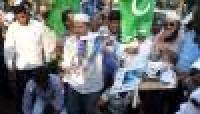Unable to handle complexities

Reportage of two gruesome events –the Delhi gang-rape and the beheading of an Indian soldier – has now been replaced by controversies involving ‘freedom of expression’. Hogging the headlines today are Ashis Nandy’s reference to the Scheduled Castes in the context of corruption and the ban on actor/director/producer Kamal Haasan’s film Viswaroopam. The issue of actor Shah Rukh Khan’s take on being a Muslim in India has just about moved to the back burner.
The physical violence that claimed two precious lives has led to much inward looking, but calling for equal or perhaps more introspection is the mental violence that has followed perceived victimisation of certain groups.
A dissection of Nandy’s statement in the context of his work and thought may be a tough call for most of us. But the tragedy of the times is that there are few others with the intellectual ability to do so and that such experts are definitely not in the media. With no option then, we are mute witnesses to a spectacle played out largely in the media leaving us clueless about the real issues at hand. Earlier in the month, a reference to Swami Vivekananda’s ‘masculine photographic-pose’ in an academic sociological analysis of the cult of masculinity in the Indian society drew a slew of protests that the editor of the newspaper that featured the ‘Opinion’ was forced to disassociate with the ‘views’ of the author.
The producer of the film Viswaroopam, which makes a distinction between a patriotic Indian Muslim, the hero being one, and the bloodthirsty Taliban in Afghanistan who see themselves as jehadis, is caught up in a wrangle with courts and cultural leaders. It is worth noting that the film is yet to be seen by the people, the ‘supreme force in a democracy’, but is sought to be banned based on the perceptions of a few functionaries and political leaders. Perhaps Shah Rukh Khan’s response to the reactions to his article in Outlook magazine sums it all up best, “I think some of the people have not even read it and are reacting to comments of people, who in turn have also not read it.”
This piece is not to defend any of the views expressed, but the right of those to express them and a plea for such views to be dealt with democratically. The first cause of concern is that in all the above cases fuelling the controversies have been hidden agendas of various vested interests. Nandy’s views have been politicised; Kamal Haasan suspects he is a pawn in a political game which comes as no surprise in a state where cinema and politics have been intrinsically linked over the years; and responses to Shah Rukh Khan’s piece has led to a diplomatic row between India and Pakistan. Nandy’s extensive writings on the marginalised, Kamal Haasan’s and Shah Rukh Khan’s work within and without the film industry have been summarily dismissed in the preoccupation with these slivers picked and often presented out of context. The increasing frequency of such incidents and more significantly, the (dis)engagement of the media and the masses, leading to fears of culture wars, cannot be ignored.
Secondly, given the murky politics that cloud the issues, the reason for the unwillingness of the masses to engage with divergent views is difficult to list. It could be the increasing inequalities in the world today that has led to perceived victimisation; or the growing intolerance to diversities worldwide; or just ‘political-correctness gone mad’, a fate bemoaned in the liberal democracies of the West, where lesser and lesser tolerance for dissenting views has led to fears of a culture of self-censorship.
Or more importantly, it could be an offshoot of the ‘Murdochisation’ of news which makes news a form of entertainment programming that precludes serious consideration, which readers of the Hoot are well aware of. This leads us to the third cause for concern. The similarity between the media and the masses in resisting divergent views is uncanny. How much has the media culture of stifling dissenting opinions impacted upon society? After all, as has been theorised by many, the erosion of the fourth estate has been led from the front by 24x7 television which, by drawing on the values and beliefs of the ‘broadest social consensus’, has effected a change in the nature of news, both in the information that qualifies as ‘news’ and the manner in which it is presented. The sensationalism and simplification of all information that media resorts to in its efforts to cater to the lowest common denominator leaves no place for subtleties or ironies. When rational debate takes flight from the media, the ‘public sphere’, the premise on which the ‘fourth estate’ ideal of the media rests, becomes irrelevant. Could the current incidents then be read as the media’s impact upon societal values?
The few sane voices that dot the media landscape are yet to make a difference. Social networking sites are awash with indignation at the efforts to silence dissenting voices. Freedom of expression and its importance in a democracy has been trending on Twitter these past few days. Posts bemoaning the ‘cultural terrorism’ spreading in the country also ask what individuals can do in the face of such organised efforts to stifle views. While this highlights the helplessness of the common man, it also showcases the limitations of what has come to be known ‘Facebook activism’.
The issue no doubt requires a longer and more sustained inquiry than this column provides. The demand for the arrest of an intellectual, the persistent refusal of both the political and cultural leadership to allow the screening of a film and clamour for relocation of a ‘Muslim’ actor forebodes ill for the freedom of expression of less powerful or distinguished individuals. The mental ossification of the masses and the media is indicative of a society that is losing its ability to handle the complexities that dog it.






